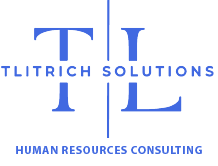There are many different roles when it comes to the field of Human Resources. Every business has unique HR needs.
Here’s a list of different HR roles along with their key responsibilities and how they differ from each other. Let TLitrich Solutions know which HR tasks your business needs help with.
1. HR Generalist
- Responsibilities: A jack-of-all-trades in HR, handling various tasks across the HR spectrum, such as recruitment, onboarding, employee relations, benefits administration, compliance, and training.
- Difference: HR Generalists are broad in scope, covering many HR functions without specializing in one area.
2. HR Manager
- Responsibilities: Oversees the HR department, manages HR staff, develops HR policies, and ensures alignment with company goals. They handle more strategic tasks like workforce planning and talent management.
- Difference: HR Managers typically have supervisory responsibilities and focus on strategy and policy implementation, whereas Generalists are more hands-on with day-to-day tasks.
3. HR Specialist
- Responsibilities: Focuses on a specific area of HR, such as recruitment, employee benefits, or training and development. They provide in-depth expertise in their chosen field.
- Difference: Unlike HR Generalists, Specialists concentrate on one HR function, becoming subject-matter experts.
4. Recruitment Specialist/Recruiter
- Responsibilities: Manages the recruitment process, including sourcing, interviewing, and hiring candidates. They work closely with hiring managers to fill open positions.
- Difference: Recruiters focus solely on talent acquisition, unlike HR Generalists who handle various HR tasks.
5. HR Business Partner (HRBP)
- Responsibilities: Works closely with specific business units, aligning HR strategies with business goals. They provide strategic guidance and help manage change within the organization.
- Difference: HRBPs have a strategic role and focus on aligning HR functions with business needs, unlike HR Managers who oversee the HR department as a whole.
6. HR Coordinator
- Responsibilities: Provides administrative support to the HR department, such as maintaining employee records, scheduling interviews, and assisting with onboarding.
- Difference: HR Coordinators are entry-level roles focused on administrative tasks, while Generalists and Specialists handle more complex HR functions.
7. Compensation and Benefits Manager
- Responsibilities: Designs and manages the organization’s compensation and benefits programs, ensuring competitiveness and compliance with regulations.
- Difference: This role is highly specialized, focusing exclusively on compensation and benefits, unlike HR Generalists or Managers who cover broader HR areas.
8. Training and Development Manager
- Responsibilities: Develops, implements, and oversees training programs for employees to improve their skills and advance their careers.
- Difference: Focuses exclusively on employee development, contrasting with HR Generalists who handle multiple HR functions.
9. Employee Relations Specialist
- Responsibilities: Manages relationships between the organization and its employees, handling conflicts, grievances, and disciplinary actions.
- Difference: Specializes in maintaining positive employee relations, whereas HR Managers and Generalists cover a broader range of HR activities.
10. HR Director
- Responsibilities: Leads the entire HR department, sets HR strategy, and works with executive leadership to align HR with organizational goals. They oversee HR Managers and other HR staff.
- Difference: HR Directors operate at a higher strategic level compared to HR Managers, focusing on long-term HR strategy and policy.
11. Chief Human Resources Officer (CHRO)
- Responsibilities: A C-level executive responsible for the overall HR strategy of the organization. They are involved in high-level decision-making and work closely with the CEO and other executives.
- Difference: The CHRO is at the top of the HR hierarchy, with a focus on overarching strategy and executive leadership, unlike Directors or Managers who handle more department-specific tasks.
12. Talent Acquisition Manager
- Responsibilities: Oversees the recruitment team and develops strategies for attracting and retaining top talent. They manage the full recruitment lifecycle.
- Difference: Similar to a Recruitment Specialist but at a managerial level, focusing on strategy and overseeing recruitment processes.
13. HR Compliance Manager
- Responsibilities: Ensures that the organization’s HR policies and practices comply with labor laws and regulations. They conduct audits and implement policies to mitigate legal risks.
- Difference: Specializes in legal compliance, unlike HR Managers who may cover compliance as one part of their broader role.
14. Payroll Specialist/Manager
- Responsibilities: Manages payroll processing, ensures accurate and timely payment of salaries, and handles tax compliance related to payroll.
- Difference: Focuses specifically on payroll, while HR Generalists might assist but not manage the entire payroll process.
15. Diversity and Inclusion (D&I) Specialist/Manager
- Responsibilities: Develops and implements diversity and inclusion programs to promote a diverse workforce and inclusive work environment.
- Difference: Specializes in D&I efforts, unlike HR Generalists or Managers who may not focus as heavily on this area.
Each role within HR has a unique focus, with some roles being more strategic (like HRBP and HR Director) and others being more specialized (like Payroll Specialist or D&I Manager). The level of responsibility and scope of work vary significantly across these roles. Let us know how TLitrich Solutions can help with your HR needs.
